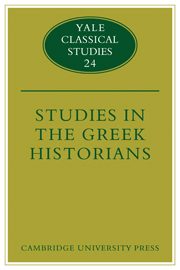Book contents
- Frontmatter
- Contents
- Preface
- In Memoriam Adam and Anne Parry
- Learning through suffering? Croesus' conversations in the history of Herodotus
- An Athenian generation gap
- Thucydides' judgment of Periclean strategy
- The speeches in Thucydides and the Mytilene debate
- Xenophon, Diodorus and the year 379/378 B.C. Reconstruction and reappraisal
- Aristotle's Athenaion Politeia and the establishment of the Thirty Tyrants
- Nearchus the Cretan
- Myth and archaeologia in Italy and Sicily – Timaeus and his predecessors
- Symploke: its role in Polybius' Histories
- Plutarch and the Megarian decree
- Herodian and Elagabalus
Learning through suffering? Croesus' conversations in the history of Herodotus
Published online by Cambridge University Press: 06 December 2010
- Frontmatter
- Contents
- Preface
- In Memoriam Adam and Anne Parry
- Learning through suffering? Croesus' conversations in the history of Herodotus
- An Athenian generation gap
- Thucydides' judgment of Periclean strategy
- The speeches in Thucydides and the Mytilene debate
- Xenophon, Diodorus and the year 379/378 B.C. Reconstruction and reappraisal
- Aristotle's Athenaion Politeia and the establishment of the Thirty Tyrants
- Nearchus the Cretan
- Myth and archaeologia in Italy and Sicily – Timaeus and his predecessors
- Symploke: its role in Polybius' Histories
- Plutarch and the Megarian decree
- Herodian and Elagabalus
Summary
The national and the human theme
Herodotus has organized the vast material of his work in a way which allows him to accentuate two major themes:
I. The long fight between Greeks and non-Greeks, including the question of war guilt.
This subject is so important to the historian that it overrides even a major structural principle of his, i.e. the chronological succession of Persian kings. By starting his work with the Lydian king Croesus, the first man he ‘knows’ to have harmed the Greeks (τὸν δὲ οἶδα αὐτὸς πρῶτον ὑπάρξαντα ἀδίκων ἔργων ἐς τοὺς ῞Ελληνας, 1. 5. 3), Herodotus is forced to break up the continuum of Persian history at a later point of his work: having related Croesus' defeat at the hands of the Persian King Cyrus II, in 547/6 b.c., he must make a digression to inform his reader about the earlier Median–Persian history in general and Cyrus' personal career specifically, before resuming his narrative which from now on will generally follow the chronology of Persian kings (although digressions are not banned).
II. The general instability of human conditions.
This theme is not referred to in the work's opening sentence which invites readers to expect conventional aspects of writing as they are expressed in the poetic tradition deriving from Homer: a writer saves human achievements from oblivion. But the theme is mentioned as soon as Herodotus, after dismissing some untrustworthy mythical constructions about war guilt (1. 1–5. 2), returns to the description of his own interests (ἐγὼ δὲ…5. 3).
- Type
- Chapter
- Information
- Studies in the Greek Historians , pp. 1 - 36Publisher: Cambridge University PressPrint publication year: 1975
- 5
- Cited by

